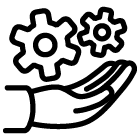Resource Crosswalk
The resources presented in this Crosswalk lend support to districts, schools, and classrooms in the continuous improvement process.
Explore the Crosswalk by selecting the content areas on the left navigation below and then select the resources appearing to the right to learn more.
Implementation
The following resources lend support to the design and action steps within the implementation process.
| Description | Type | Length | Certificate |
|---|---|---|---|
Access in a Virtual Environment for Deaf and Hard of Hearing Learners, InspirED Virtual Learning SeriesLearn proactive planning strategies from professionals, families, and learners on how to plan ahead for successful learning experience for learners who are deaf/hard of hearing. |
 |
 |
 |
Access to the General Education Curriculum/Literacy Access for ALLThis FREE, 10-part video series containing over 70 coaching videos and hundreds of resources explores strategies grounded in research that are designed to ensure ALL learners have access to the general curriculum. |
 |
 |
 |
Achievement vs LearningA 10 Minutes with Barb and Ron conversation with Melissa Emler from Wisconsin‘s "UDL Forward" Part 1 |
 |
 |
|
Designing for the Least Restrictive Environment in General EducationLeast Restrictive Environment (LRE) is a critical principle of the Individuals with Disabilities Education Act (IDEA). School districts and families often struggle with WHERE and HOW to ensure LRE. What does the law really say? How can we use the UDL framework to reduce barriers and ensure that the general education classroom is the least restrictive environment? This presentation offers an engaging discussion that will stretch our thinking, allow for collaboration, and improve outcomes for each and every learner! |
 |
 |
|
Educational Service Guidelines for the Students who are Deaf and Hard of HearingA guidance document for deaf education in Ohio that focuses on how to identify, assess, plan, provide, and monitor educational services and programs. Key concepts are essential building blocks that support evidence-based predictors for post-school success. |
 |
 |
|
Effective Practices: Supporting Youth In School, In the Community and On the Job and Predictors of Post School SuccessEffective Practices and Predictors are research-based strategies that focus on supporting transition age youth to gain critical skills and experiences. The Practices and Predictors are useful to transition professionals in school and agencies across systems and in multiple environments. |
 |
 |
|
Ohio Guidelines for Working with Students who are Blind or Visually ImpairedThe purpose Ohio Guidelines for Working with Students who are Blind or Visually Impaired is to provide guidance for decision-making for educators and families. Learners who are blind or visually impaired have a wide range of abilities, as well as needs. To support them in the general education curriculum, educators, and families must be knowledgeable of services required and resources available. |
 |
 |
|
Rethinking the Design and Implementation of Individualized Education Programs Through a UDL LensAre Individual Education Programs (IEPs) driving the changes that we want for our learners who are eligible for special education? Or have they become a boilerplate document that teams complete, but don’t use to full capacity within the classroom? The intent of the federal law IDEA is “ensuring equality of opportunity, full participation, independent living, and economic self-sufficiency for individuals with disabilities.” |
 |
 |
|
Statewide Directory of Providers Serving Learners who are D/HH or B/VIThis Statewide Directory of Providers Serving Learners who are D/HH or B/VI lists contact information for Ohio service providers including Certified Orientation and Mobility Specialist, Teachers of the Visually Impaired, Teachers of the Deaf, Educational Audiologists, and Regional Assessment Teams. |
 |
 |
|
The Communication Planning Guide for Students Who are Deaf or Hard of HearingThe Communication Planning Guide for Students Who are Deaf or Hard of Hearing is intended to help teams facilitate meaningful discussion and planning as they embark on the decision-making process to develop an individualized communication plan for students. Intentional planning that addresses the language and communication needs of children leads to proficiency and improved literacy achievement rates for students with disabilities. |
 |
 |
|
The MedEd Connections Resource Guide: Blind or Visually ImpairedThe MedEd Connections Resource Guide: Blind or Visually Impaired is designed to support families as they manage, access, and share medical and educational information concerning their children. The purpose of this guide is to help families build their understanding and connect important medical and educational information to make more informed decisions, so that their children who are blind or visually impaired (B/VI) can grow and live their best lives. |
 |
 |
|
The Supporting Learner Series: Supporting Students who are Blind or Visually ImpairedThe Supporting Learner Series: Supporting Students who are Blind or Visually Impaired offers webinars designed to explore visual impairments and considerations for supporting the whole child who is blind/visually impaired (B/VI). Learn the basics about how vision impacts intellectual and social development that are necessary for students to fully engage in learning. When learners are healthy, safe, engaged, challenged, and supported, they are more likely to enjoy learning, develop positive social skills, and achieve greater success. |
 |
 |
 |
Universal Design for Learning and Explicit InstructionA 10 Minutes with Barb and Ron about Universal Design for Learning and Explicit Instruction. |
 |
 |
|
Using UDL to Leverage Co-PlanningDo you regularly collaborate with co-teachers or other school staff to proactively plan to support the learning of all of your students in the general education classroom? If you are a general education teacher, intervention specialist, ESL teacher, speech-language pathologist, OT/PT, title teacher or another collaborative teacher, then this webinar is for you. Join us as we discuss how to use UDL to leverage co-planning. Bring your best ideas as we discuss how to make these partnerships work for the benefit of all students. |
 |
 |
|
Weaving the UDL Framework with Specially Designed Instruction: A Beautiful Tapestry with and without disabilitiesA quick 30 minutes on how Specially Designed Instruction compliments Universal Design for Learning. |
 |
 |